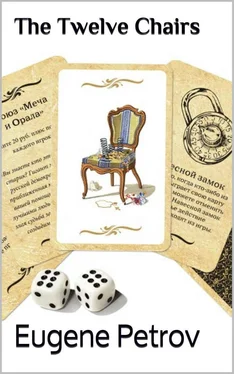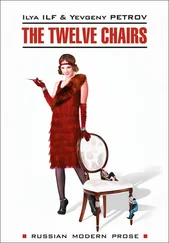Eugene Petrov - The Twelve Chairs
Здесь есть возможность читать онлайн «Eugene Petrov - The Twelve Chairs» весь текст электронной книги совершенно бесплатно (целиком полную версию без сокращений). В некоторых случаях можно слушать аудио, скачать через торрент в формате fb2 и присутствует краткое содержание. Год выпуска: 2013, Жанр: Юмористическая проза, на английском языке. Описание произведения, (предисловие) а так же отзывы посетителей доступны на портале библиотеки ЛибКат.
- Название:The Twelve Chairs
- Автор:
- Жанр:
- Год:2013
- ISBN:нет данных
- Рейтинг книги:5 / 5. Голосов: 1
-
Избранное:Добавить в избранное
- Отзывы:
-
Ваша оценка:
- 100
- 1
- 2
- 3
- 4
- 5
The Twelve Chairs: краткое содержание, описание и аннотация
Предлагаем к чтению аннотацию, описание, краткое содержание или предисловие (зависит от того, что написал сам автор книги «The Twelve Chairs»). Если вы не нашли необходимую информацию о книге — напишите в комментариях, мы постараемся отыскать её.
Find traces of a separate headset difficult and heroes face different adventures and troubles.
The Twelve Chairs — читать онлайн бесплатно полную книгу (весь текст) целиком
Ниже представлен текст книги, разбитый по страницам. Система сохранения места последней прочитанной страницы, позволяет с удобством читать онлайн бесплатно книгу «The Twelve Chairs», без необходимости каждый раз заново искать на чём Вы остановились. Поставьте закладку, и сможете в любой момент перейти на страницу, на которой закончили чтение.
Интервал:
Закладка:
moustache, which gave off a shower of sparks at the touch of the comb, and,
having cleared his throat in determination, told Ostap Bender, the first
rogue who had come his way, what his dying mother-in-law had told him about
her jewels.
During the account, Ostap jumped up several times and, turning to the
iron stove, said delightedly:
"Things are moving, gentlemen of the jury. Things are moving."
An hour later they were both sitting at the rickety table, their heads
close together, reading the long list of jewellery which had at one time
adorned the fingers, neck, ears, bosom and hair of Vorobyaninov's
mother-in-law.
Ippolit Matveyevich adjusted the pince-nez, which kept falling off his
nose, and said emphatically:
"Three strings of pearls. . . . Yes, I remember them. Two with forty
pearls and the long one had a hundred and ten. A diamond pendant . . .
Claudia Ivanovna used to say it was worth four thousand roubles; an
antique."
Next came the rings: not thick, silly, and cheap engagement rings, but
fine, lightweight rings set with pure, polished diamonds; heavy, dazzling
earrings that bathe a small female ear in multi-coloured light; bracelets
shaped like serpents, with emerald scales; a clasp bought with the profit
from a fourteen-hundred-acre harvest; a pearl necklace that could only be
worn by a famous prima donna; to crown everything was a diadem worth forty
thousand roubles.
Ippolit Matveyevich looked round him. A grass-green emerald light
blazed up and shimmered in the dark corners of the caretaker's dirty room. A
diamond haze hung near the ceiling. Pearls rolled across the table and
bounced along the floor. The room swayed in the mirage of gems. The sound of
Ostap's voice brought the excited Ippolit Matveyevich back to earth.
"Not a bad choice. The stones have been tastefully selected, I see. How
much did all this jazz cost?"
"Seventy to seventy-five thousand."
"Hm . . . Then it's worth a hundred and fifty thousand now."
"Really as much as that?" asked Ippolit Matveyevich jubilantly.
"Not less than that. However, if I were you, dear friend from Paris, I
wouldn't give a damn about it."
"What do you mean, not give a damn?"
"Just that. Like they used to before the advent of historical
materialism."
"Why?"
"I'll tell you. How many chairs were there?"
"A dozen. It was a drawing-room suite."
"Your drawing-room suite was probably used for firewood long ago."
Ippolit Matveyevich was so alarmed that he actually stood up.
"Take it easy. I'll take charge. The hearing is continued.
Incidentally, you and I will have to conclude a little deal."
Breathing heavily, Ippolit Matveyevich nodded his assent. Ostap Bender
then began stating his terms.
"In the event of acquisition of the treasure, as a direct partner in
the concession and as technical adviser, I receive sixty per cent. You
needn't pay my national health; I don't care about that."
Ippolit Matveyevich turned grey.
"That's daylight robbery!"
"And how much did you intend offering me? "
"Well. . . er . . . five per cent, or maybe even ten per cent. You
realize, don't you, that's fifteen thousand roubles!"
"And that's all?"
"Yes
"Maybe you'd like me to work for nothing and also give you the key of
the apartment where the money is? "
"In that case, I'm sorry," said Vorobyaninov through his nose.
"I have every reason to believe I can manage the business by myself."
"Aha! In that case, I'm sorry," retorted the splendid Ostap. "I have
just as much reason to believe, as Andy Tucker used to say, that I can also
manage your business by myself."
"You villain!' cried Ippolit Matveyevich, beginning to shake.
Ostap remained unmoved.
"Listen, gentleman from Paris, do you know your jewels are practically
in my pocket? And I'm only interested in you as long as I wish to prolong
your old age."
Ippolit Matveyevich realized at this point that iron hands had gripped
his throat.
"Twenty per cent," he said morosely.
"And my grub?" asked Ostap with a sneer.
"Twenty-five."
"And the key of the apartment?"
"But that's thirty-seven and a half thousand!"
"Why be so precise? Well, all right, I'll settle for fifty per cent.
We'll go halves."
The haggling continued, and Ostap made a further concession. Out of
respect for Vorobyaninov, he was prepared to work for forty per cent.
"That's sixty thousand!" cried Vorobyaninov.
"You're a rather nasty man," retorted Bender. "You're too fond of
money."
"And I suppose you aren't?" squeaked Ippolit Matveyevich in a flutelike
voice.
"No, I'm not."
"Then why do you want sixty thousand? "
"On principle!"
Ippolit Matveyevich took a deep breath.
"Well, are things moving?" pressed Ostap.
Vorobyaninov breathed heavily and said humbly: "Yes, • things are
moving."
"It's a bargain. District Chief of the Comanchi!"
As soon as Ippolit Matveyevich, hurt by the nickname, "Chief of the
Comanchi", had demanded an apology, and Ostap, in a formal apology, had
called him "Field Marshal", they set about working out their disposition.
At midnight Tikhon, the caretaker, hanging on to all the garden fences
on the way and clinging to the lamp posts, tottered home to his cellar. To
his misfortune, there was a full moon.
"Ah! The intellectual proletarian! Officer of the Broom!" exclaimed
Ostap, catching sight of the doubled-up caretaker.
The caretaker began making low-pitched, passionate noises of the kind
sometimes heard when a lavatory suddenly gurgles heatedly and fussily in the
stillness of the night.
"That's nice," said Ostap to Vorobyaninov. "Your caretaker is rather a
vulgar fellow. Is it possible to get as drunk as that on a rouble?"
"Yes, it is," said the caretaker unexpectedly.
"Listen, Tikhon," began Ippolit Matveyevich. "Have you any idea what
happened to my furniture, old man ? "
Ostap carefully supported Tikhon so that the words could flow freely
from his mouth. Ippolit Matveyevich waited tensely. But the caretaker's
mouth, in which every other tooth was missing, only produced a deafening
yell:
"Haa-aapy daa-aays . .."
The room was filled with an almighty din. The caretaker industriously
sang the whole song through. He moved about the room bellowing, one moment
sliding senseless under a chair, the next moment hitting his head against
the brass weights of the clock, and then going down on one knee. He was
terribly happy.
Ippolit Matveyevich was at a loss to know what to do.
"Cross-examination of the witness will have to be adjourned until
tomorrow morning," said Ostap. "Let's go to bed."
They carried the caretaker, who was as heavy as a chest of drawers, to
the bench.
Vorobyaninov and Ostap decided to sleep together in the caretaker's
bed. Under his jacket, Ostap had on a red-and-black checked cowboy shirt;
under the shirt, he was not wearing anything. Under Ippolit Matveyevich's
yellow waistcoat, already familiar to readers, he was wearing another
light-blue worsted waistcoat.
"There's a waistcoat worth buying," said Ostap enviously. "Just my
size. Sell it to me!"
Ippolit Matveyevich felt it would be awkward to refuse to sell the
waistcoat to his new friend and direct partner in the concession.
Frowning, he agreed to sell it at its original price-eight roubles.
"You'll have the money when we sell the treasure," said Bender, taking
Читать дальшеИнтервал:
Закладка:
Похожие книги на «The Twelve Chairs»
Представляем Вашему вниманию похожие книги на «The Twelve Chairs» списком для выбора. Мы отобрали схожую по названию и смыслу литературу в надежде предоставить читателям больше вариантов отыскать новые, интересные, ещё непрочитанные произведения.
Обсуждение, отзывы о книге «The Twelve Chairs» и просто собственные мнения читателей. Оставьте ваши комментарии, напишите, что Вы думаете о произведении, его смысле или главных героях. Укажите что конкретно понравилось, а что нет, и почему Вы так считаете.












